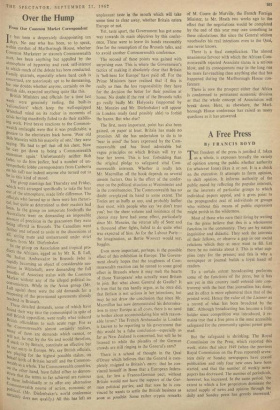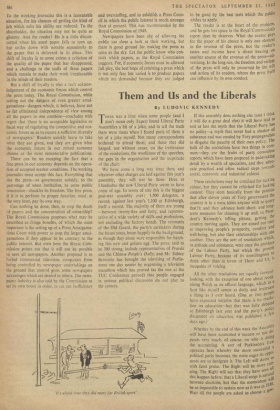A Free Press
By FRANCIS BOYD
TFIE freedom of the press is justified if, taken as a whole, it expresses broadly the variety of opinion among the public whether authority
(in whatever form) likes it or not. It is a check on the executive. It attempts to form opinion, to shift opinion. It informs authority of the public mood by reflecting the popular interests, or the interests of particular groups to which individual papers appeal, and it gives point to the propagandist zeal of individuals or groups who without this means of public expression might perish in the wilderness.
Most of those who earn their living by writing for the press believe that this is a wholesome function in the community. They are by nature inquisitive and didactic. They seek the interests of their fellows, or observe a gap in our social relations which they at once want to fill. Let there be no mistake about it. This is what sup- plies copy for the presses; and this is why a newspaper or journal builds a loyal band of readers.
To a certain extent broadcasting performs some of the functions of the press, but it has not yet in this country itself entered into con- troversy with the heat that journalism has done, and its effect is more ephemeral than that of the printed word. Hence the value of the Listener as a record of what has been broadcast by the BBC. Although broadcasting has become a little bolder since competition was introduced, it re- mains true that a free press is the most accessible safeguard for the community against power gone mad.
But the safeguard is shrinking. The Royal Commission on the Press, which reported this week, states that since 1949 (when the previous Royal Commission on the Press reported) seven- teen daily or Sunday newspapers have ceased publication and only four new ones have been started, and that the number of weekly news- papers has decreased. The number of periodicals, however, has increased. In the same period, 'the extent to which a few proprietors dominate the • actual supply of news and opinion through the daily and Sunday press has greatly increased.'
To the working journalist this is a lamentable situation, for his chances of getting the kind of job which suits his ability are reduced. To the shareholder, the situation may not be quite so gloomy. And the reader? He is a little discon- certed when his usual paper fails to turn up, but settles down with notable equanimity to the paper that is delivered in its place. This shift of loyalty is to some extent a criticism of the quality of the paper that has disappeared, and a challenge to the staffs of those papers which remain to make their work irreplaceable in the minds of their readers.
But a shift of loyalty is also a tacit acknow- ledgement of the economic forces which control the press today. The Royal Commission, while setting out the dangers of even greater amal- gamations—dangers which, it believes, have not so far eliminated independence of view among all the papers in one combine—concludes with regret that 'there is no acceptable legislative or fiscal way of regulating the competitive and eco- nomic forces so as to ensure a sufficient diversity of newspapers.' Readers quickly learn to take what they are given, and they are given what the economic forces in our mixed economy choose as the most remunerative publications.
There can be no escaping the fact that a free press in our economy depends on the opera- tion of accepted market conditions. The working journalist must accept this fact. Everything that lies the press—to government subsidy, to the patronage of some institution, to some public concession--shackles its freedom. The free press, if it is to perform its proper function. must, at the very least, pay its own way.
Can nothing be done, then, to stop the death of papers and the concentration of ownership? The Royal Commission proposes what may be described as fringe benefits, of which the most important is the setting up of a Press Amalgama- tions Court with power to stop the larger amal- gamations if they appear to be contrary to the public interest. But even here the Royal Com- mission points out that it will not be possible to save all newspapers. Another proposal is to forbid commercial television companies from being controlled by newspaper undertakings on the ground that control gives some newspapers advantages which arc denied to others. The news- paper industry is also told by the Commission to set its own house in order, to cut out inefficiency and overstaffing, and to establish a Press Coun- cil in which the public interest is much stronger than at present. This was recommended by the Royal Commission of 1949.
Newspapers have been shy of allowing the public too close a look at their working, but there is good ground for making the press as open as the sky. Let the public know who con- trols which papers, as the Royal Commission suggests. For, if economic forces must be allowed full play, the best hope of retaining a press which is not only free but varied is to produce papers which are demanded because they are judged to be good by the best tests which the public wishes to apply.
The reader is at the heart of the problem, and he gets less space in the Royal Commiisions report than he deserves. What the reader pays fcr the paper of his choice is only one element in the revenue of the press, but the reader's tastes and income have 'a direct bearing on another source of the revenue of the press—ad- vertising. In the long run, the freedom and variety of the press will only be preserved by the Will and action of its readers, whom the press itself can influence by its own conduct.











































 Previous page
Previous page